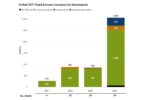Last week, the Thailand SEC Secretary-General Ruenvadee Suwanmongkol announced that blockchain is at the forefront of a master plan to improve the capital markets in the country, with a pilot project for corporate bonds.
The Thai baht reigns as one of the best-performing currencies in Asia and serves as an indicator of the country’s economic stability. Additionally, the country is exploring other avenues to boost trade and commerce. Complementing this effort is the SEC’s (Security & Exchange Commission) recent announcement of a Master Blueprint for the Thai Capital Market.
The goal is to use distributed ledger technology (DLT) to increase efficiency, reduce costs and increase access to capital markets for investors.
“The Master Blueprint contains the overview of how the Thai capital market can apply DLT to various processes, from issuance and offering for sale in the primary and secondary markets to post-offering processes related to corporate bonds, SME shares, mutual funds and derivatives,” said the SEC Secretary-General in a statement.
The pilot project will be run in a regulatory sandbox, with the addition of more financial instruments by 2022 depending on the outcome of the trial, reported Bangkok Post. Critically the SEC believes the initiative does not require any regulatory changes so the project can be expedited.
“The new digital platform also covers clearing and settlement, register of instrument holders, custody of instruments, and payment of interest or dividends,” added Suwanmongkol.
A similar project is already in place by the Thailand Bond Market Association, which announced it is adopting blockchain for registration and will use tokens for faster settlement of trades. The Association is also part of the Digital Infrastructure for Capital Market Steering Committee for the SEC project.
Other Committee members include the Stock Exchange of Thailand, the Thai Bankers Association, the Association of International Banks, and several others.
Accenture is the technology partner for the project, and Baker Mckenzie is the legal advisor.
Meanwhile, the Bank of Thailand (BOT) has already run a successful proof of concept for a wholesale Central Bank Digital Currency (CBDC), with further tests ongoing. The PoC found that DLT increased the overall efficiency and reduced risks and costs in the financial ecosystem.
Among other applications, the Thai government announced three blockchain projects for VAT refunds, bonds and procurement.
The number of blockchain projects active in Thailand indicates the eagerness to advance financial markets using technology. Thailand is also using DLT to develop a National Digital Trade Platform (NDTP) and conducted a trial with NTT Data and a proof of value demonstration with Ping An’s OneConnect.






